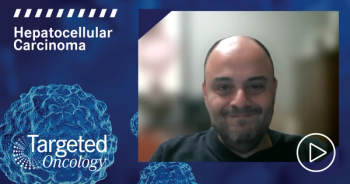
Richard Finn, MD: Principal Treatment Options for a Patient with Recurrent uHCC
What are the principal treatment options for this patient with recurrent uHCC?
So this is a fairly typical patient we would see in the office. This is a gentleman who’s had chronic hepatitis B probably his whole life. We can see that from the family history, as well, that they’ve had a history of hepatitis B and liver cancer related to that. Unfortunately, this patient has not been in a screening program even though they have a family history of hepatitis B. This lesion is being found quite late. From the case, we see he is presenting with a fairly large lesion, a 12 cm lesion in the liver which is symptomatic. He’s having some pain. His performance status is 1. The diagnosis of this cancer can be made radiographically given the underlying history of hepatitis B, and if imaging were to suggest a hypervascular lesion, a biopsy would not be required.
The other data we have in this case is that he is well compensated. Again, not so uncommon with hepatitis B is we do see liver cancer before the development of overt cirrhosis and decompensated liver disease. It’s a little different than patients with hepatitis C. I think, for many of us, when we see a patient with a newly diagnosed liver cancer that’s confined to the liver, from the data we have, there’s no evidence of disease outside of the liver, there’s no mention of vascular invasion, that this patient would be reviewed at a multidisciplinary tumor board with the possibility of a surgical resection. Resection offers the only chance of cure for this disease or transplant, for that matter, but he is well beyond any transplant criteria. And while the lesion is large and the chance of recurrence after a resection is higher with a larger lesion, I think still many surgeons, if the patient was an operable candidate, would consider them for a resection even though the chance of cure in this specific case might be considerably low.
But, as we learn from the case, he has a disease burden that is not resectable or he has some other physiologic reason he can’t be resected, always keeping in mind liver cancer is two diseases. It’s a malignancy and complications of liver disease.
CASE 1: Unresectable Hepatocellular Carcinoma (uHCC)
Mario C is a 74-year-old retired steel worker from Allentown, Pennsylvania. His past medical history is notable for hepatitis B virus (HBV) infection (diagnosed in early 1990s).
In July 2013, patient was referred to a hepatologist with an elevated ALT (70 IU/mL) and AST (53 IU/mL).
Medical history is also notable for mild hypertension (currently controlled on antihypertensives) and hypercholesterolemia (currently controlled with diet); patient denies any alcohol use
Family history was relevant for an older brother who died of HCC and chronic HBV infection at age 70
On physical exam, no evidence of liver disease was noted and patient did not report any recent weight loss; patient reported some intermittent abdominal pain and there was mild tenderness in the lower right quadrant on palpation
Ultrasound revealed a poorly defined mass in the right lobe; contrast enhanced MRI showed a 12-cm mass in the lower right segment consistent with HCC and several smaller nodules. Bone scan and chest CT showed no evidence of metastatic disease
Patient presented to the Multidisciplinary Team (MDT) with Child Pugh Class A, with a MELD score of 7; patient’s performance status was 1
On surgical consult, the patient was deemed unresectable and the MDT recommended a TACE procedure for the larger lesion
In December of 2014, evidence of residual disease was detected on a follow up CT scan at the site of the first TACE procedure; smaller nodules also showed evidence of radiologic progression.




















